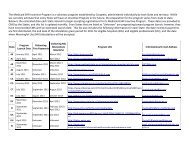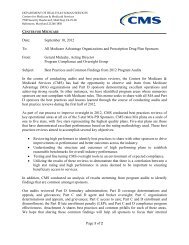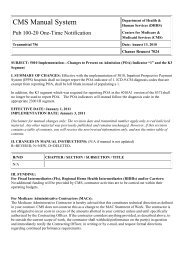CMS Manual System - Centers for Medicare & Medicaid Services
CMS Manual System - Centers for Medicare & Medicaid Services
CMS Manual System - Centers for Medicare & Medicaid Services
Create successful ePaper yourself
Turn your PDF publications into a flip-book with our unique Google optimized e-Paper software.
• Unrecognized blood loss. Patients with kidney disease and anemia may easily<br />
have chronic blood loss (usually gastrointestinal) as a major cause of anemia. In<br />
those circumstances, EPO is limited in effectiveness;<br />
• Concomitant hemolysis, bone morrow dysplasia, or refractory anemia <strong>for</strong> a reason<br />
other than renal disease, e.g., aluminum toxicity;<br />
• Folic acid or vitamin B12 deficiencies;<br />
• Circumstances in which the bone morrow is replaced with other tissue, e.g.,<br />
malignancy or osteitis fibrosa cystica; and<br />
• Patient’s weight, the current dose required, a historical record of the amount that<br />
has been given, and the hematocrit response to date.<br />
60.4.3.1 – Payment <strong>for</strong> Epoetin Alfa (EPO) in Other Settings<br />
(Rev 118, 03-05-04)<br />
A3-3644<br />
In the hospital inpatient setting, payment is included in the DRG.<br />
In a skilled nursing facility (SNF), payment <strong>for</strong> EPO covered under the Part B EPO<br />
benefit is not included in the prospective payment rate <strong>for</strong> the resident’s <strong>Medicare</strong>covered<br />
SNF stay.<br />
In a hospice, payment is included in the hospice per diem rate.<br />
For a service furnished by a physician or incident to a physician’s service, payment is<br />
made to the physician by the carrier in accordance with the rules <strong>for</strong> ‘incident to”<br />
services. When EPO is administered in the renal facility, the service is not an “incident<br />
to” service and not under the “incident to” provision.<br />
60.4.3.2 – Epoetin Alfa (EPO) Provided in the Hospital Outpatient<br />
Departments<br />
(Rev 118, 03-05-04)<br />
PM-A-01-106<br />
For patients with chronic renal failure who are not yet on a regular course of dialysis,<br />
EPO administered in a hospital outpatient department is paid under the Outpatient<br />
Prospective Payment <strong>System</strong> (OPPS).<br />
Hospitals use type of bill 13X and report charges under revenue code 0636 with HCPCS<br />
code Q0136 and without value codes 48, 49, 68 or condition codes 70 through 76.



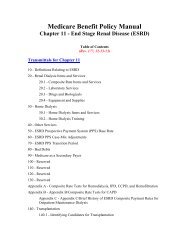
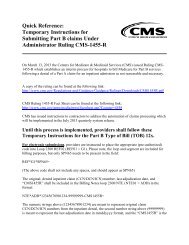
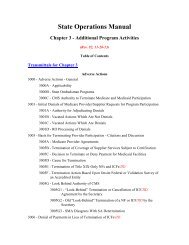
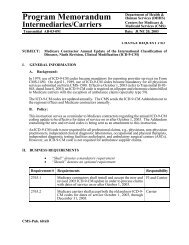
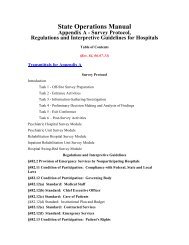

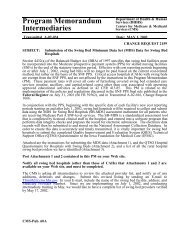



![CMS Change Management Policy [PDF, 106KB] - Centers for ...](https://img.yumpu.com/22011244/1/190x245/cms-change-management-policy-pdf-106kb-centers-for-.jpg?quality=85)
